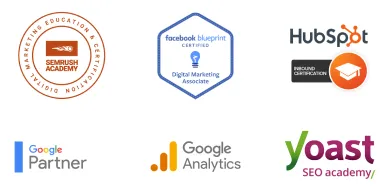TO LEARN IS TO GROW
Learning Center
We do our research and publish our results. Should probably call this the Growing Center.


ADA Tax Credit for Web Accessibility: Eligibility and Stipulations
As the internet has become an integral part of our daily lives, web accessibility has become increasingly important for individuals with disabilities. The Americans with Disabilities Act (ADA) was amended in 2008 to include provisions for web accessibility to ensure that everyone can access digital content. To incentivize businesses to make their websites and other digital content accessible to individuals with disabilities, the IRS launched the ADA Tax Credit in 2021. In this blog, we explain what ADA Tax Credit is, who qualifies, and the key stipulations to keep in mind for businesses.
We at LOJO Marketing recognize the significance of website accessibility for businesses. Therefore, we have collaborated with AccessAPal, an advanced AI software that can aid you in achieving ADA and WCAG compliance. The software offers exceptional features such as text-to-speech functionality, magnification, color contrast adjustment, keyboard shortcuts, and more to enhance navigation. Schedule a free consultation with us today or call (916) 303-4080 to learn more.
What Is Accessibility and Why Does It Matter?
Accessibility refers to the design and development of digital content, such as websites and applications, to ensure that everyone can use it, including individuals with disabilities. This includes designing websites that can be navigated using keyboard-only controls, providing text alternatives for non-text content, and ensuring that color contrast is sufficient for individuals with visual impairments.
In that regard, accessibility is important because it ensures everyone has equal access to information and services online. When websites are not accessible, individuals with disabilities may be excluded from using them, leading to social isolation and exclusion from important services and resources.
What Is the ADA Tax Credit?
The ADA Tax Credit is a federal tax credit that businesses can claim for making their websites and other digital content more accessible to individuals with disabilities. The credit covers up to 50% of eligible expenses, with a maximum credit of $5,000 per year.
To qualify for the credit, businesses must have either:
Gross receipts of $1 million or less for the previous tax year
No more than 30 full-time employees during the previous tax year
The ADA Tax Credit can be claimed for eligible expenses incurred during the tax year. Eligible expenses include costs associated with making web content more accessible, such as:
Conducting an accessibility audit
Purchasing software or hardware to improve accessibility
Hiring a consultant or developer to improve accessibility
Training staff on web accessibility best practices
Who Qualifies for the ADA Tax Credit?
To qualify for the ADA Tax Credit, your business must meet certain criteria. As mentioned earlier, your business must have gross receipts of $1 million or less for the previous tax year or have no more than 30 full-time employees during the previous tax year. In addition, you must have made improvements to your website or other digital content to make it more accessible to individuals with disabilities.
It’s important to note that the ADA Tax Credit is only available to businesses that have incurred eligible expenses during the tax year. Therefore, if you have not made any improvements to your website’s accessibility, you will not qualify for the credit.
Key Stipulations To Keep In Mind
When claiming the ADA Tax Credit, businesses should keep several key stipulations in mind.
First, the credit is only available for eligible expenses incurred during the tax year; if you incurred eligible expenses in a previous tax year, you cannot claim them in the current year.
Second, the credit is only available for businesses that have made improvements to their website or other digital content to make it more accessible to individuals with disabilities. Thus, if you have not made any accessibility improvements, you will not be eligible for the credit.
Finally, it’s important to note that the ADA Tax Credit is subject to certain limitations. The maximum credit is $5,000 per year, and the credit cannot be carried forward or back. In addition, the credit is non-refundable, which means that if the credit exceeds your tax liability, you will not receive a refund for the excess amount.

Benefits of Website Accessibility (Beyond Legal Obligations)
There are several benefits of website accessibility beyond the legal obligations of the ADA, including:
Improved User Experience: An accessible website is easier to use for everyone, not just individuals with disabilities. By improving website accessibility, you can create a more user-friendly website that is easier to navigate, understand, and use.
Increased Audience Reach: By making your website accessible, you can reach a wider audience, including individuals with disabilities who may have otherwise been excluded from accessing your content, leading to increased traffic, engagement, and conversions on your website.
Better SEO: Accessibility features such as alt text, proper heading structure, and descriptive links can improve your website’s search engine optimization (SEO), making it more likely to rank higher in search engine results pages (SERPs).
Enhanced Brand Reputation: By prioritizing accessibility, you show that your business values inclusion and diversity, which can enhance your brand reputation and build customer loyalty.
Reduced Legal Risks: While meeting legal obligations is important, accessible websites can also reduce the risk of potential legal action by individuals with disabilities. Hence, by proactively addressing accessibility, you can avoid costly lawsuits, negative publicity, and damage to your brand reputation.
Conclusion
The ADA Tax Credit is a valuable incentive for businesses looking to make their websites and other digital content more accessible to individuals with disabilities. By claiming the credit, you can offset the costs associated with improving accessibility and ensure everyone can access your digital content.
Also, website accessibility benefits not only individuals with disabilities but also your business by improving the user experience, increasing audience reach, enhancing SEO, building brand reputation, and reducing legal risks.
If you’re interested in claiming the ADA Tax Credit, be sure to keep the key stipulations in mind and consult with a tax professional to ensure that you meet all the eligibility requirements.
Finally, contact us to ensure your website meets ADA compliance and qualifies for the ADA Tax Credit — call LOJO Marketing at (916) 303-4080 today.

ADA Tax Credit for Web Accessibility: Eligibility and Stipulations
As the internet has become an integral part of our daily lives, web accessibility has become increasingly important for individuals with disabilities. The Americans with Disabilities Act (ADA) was amended in 2008 to include provisions for web accessibility to ensure that everyone can access digital content. To incentivize businesses to make their websites and other digital content accessible to individuals with disabilities, the IRS launched the ADA Tax Credit in 2021. In this blog, we explain what ADA Tax Credit is, who qualifies, and the key stipulations to keep in mind for businesses.
We at LOJO Marketing recognize the significance of website accessibility for businesses. Therefore, we have collaborated with AccessAPal, an advanced AI software that can aid you in achieving ADA and WCAG compliance. The software offers exceptional features such as text-to-speech functionality, magnification, color contrast adjustment, keyboard shortcuts, and more to enhance navigation. Schedule a free consultation with us today or call (916) 303-4080 to learn more.
What Is Accessibility and Why Does It Matter?
Accessibility refers to the design and development of digital content, such as websites and applications, to ensure that everyone can use it, including individuals with disabilities. This includes designing websites that can be navigated using keyboard-only controls, providing text alternatives for non-text content, and ensuring that color contrast is sufficient for individuals with visual impairments.
In that regard, accessibility is important because it ensures everyone has equal access to information and services online. When websites are not accessible, individuals with disabilities may be excluded from using them, leading to social isolation and exclusion from important services and resources.
What Is the ADA Tax Credit?
The ADA Tax Credit is a federal tax credit that businesses can claim for making their websites and other digital content more accessible to individuals with disabilities. The credit covers up to 50% of eligible expenses, with a maximum credit of $5,000 per year.
To qualify for the credit, businesses must have either:
Gross receipts of $1 million or less for the previous tax year
No more than 30 full-time employees during the previous tax year
The ADA Tax Credit can be claimed for eligible expenses incurred during the tax year. Eligible expenses include costs associated with making web content more accessible, such as:
Conducting an accessibility audit
Purchasing software or hardware to improve accessibility
Hiring a consultant or developer to improve accessibility
Training staff on web accessibility best practices
Who Qualifies for the ADA Tax Credit?
To qualify for the ADA Tax Credit, your business must meet certain criteria. As mentioned earlier, your business must have gross receipts of $1 million or less for the previous tax year or have no more than 30 full-time employees during the previous tax year. In addition, you must have made improvements to your website or other digital content to make it more accessible to individuals with disabilities.
It’s important to note that the ADA Tax Credit is only available to businesses that have incurred eligible expenses during the tax year. Therefore, if you have not made any improvements to your website’s accessibility, you will not qualify for the credit.
Key Stipulations To Keep In Mind
When claiming the ADA Tax Credit, businesses should keep several key stipulations in mind.
First, the credit is only available for eligible expenses incurred during the tax year; if you incurred eligible expenses in a previous tax year, you cannot claim them in the current year.
Second, the credit is only available for businesses that have made improvements to their website or other digital content to make it more accessible to individuals with disabilities. Thus, if you have not made any accessibility improvements, you will not be eligible for the credit.
Finally, it’s important to note that the ADA Tax Credit is subject to certain limitations. The maximum credit is $5,000 per year, and the credit cannot be carried forward or back. In addition, the credit is non-refundable, which means that if the credit exceeds your tax liability, you will not receive a refund for the excess amount.

Benefits of Website Accessibility (Beyond Legal Obligations)
There are several benefits of website accessibility beyond the legal obligations of the ADA, including:
Improved User Experience: An accessible website is easier to use for everyone, not just individuals with disabilities. By improving website accessibility, you can create a more user-friendly website that is easier to navigate, understand, and use.
Increased Audience Reach: By making your website accessible, you can reach a wider audience, including individuals with disabilities who may have otherwise been excluded from accessing your content, leading to increased traffic, engagement, and conversions on your website.
Better SEO: Accessibility features such as alt text, proper heading structure, and descriptive links can improve your website’s search engine optimization (SEO), making it more likely to rank higher in search engine results pages (SERPs).
Enhanced Brand Reputation: By prioritizing accessibility, you show that your business values inclusion and diversity, which can enhance your brand reputation and build customer loyalty.
Reduced Legal Risks: While meeting legal obligations is important, accessible websites can also reduce the risk of potential legal action by individuals with disabilities. Hence, by proactively addressing accessibility, you can avoid costly lawsuits, negative publicity, and damage to your brand reputation.
Conclusion
The ADA Tax Credit is a valuable incentive for businesses looking to make their websites and other digital content more accessible to individuals with disabilities. By claiming the credit, you can offset the costs associated with improving accessibility and ensure everyone can access your digital content.
Also, website accessibility benefits not only individuals with disabilities but also your business by improving the user experience, increasing audience reach, enhancing SEO, building brand reputation, and reducing legal risks.
If you’re interested in claiming the ADA Tax Credit, be sure to keep the key stipulations in mind and consult with a tax professional to ensure that you meet all the eligibility requirements.
Finally, contact us to ensure your website meets ADA compliance and qualifies for the ADA Tax Credit — call LOJO Marketing at (916) 303-4080 today.
Growing Businesses Since 2008
We have helped hundreds of businesses just like yours. Working for or along-side of business owner, managers, staff, or even board of directors, LOJO is ready to be an asset to your business.
Our team has been curated through the years for individual skills, personalities, and capabilities. Our clients put their trust in us to help them grow. We are here to do just that.



Growing Businesses Since 2008
We have helped hundreds of businesses just like yours. Working for or along-side of business owner, managers, staff, or even board of directors, LOJO is ready to be an asset to your business.
Our team has been curated through the years for individual skills, personalities, and capabilities. Our clients put their trust in us to help them grow. We are here to do just that.




Matthew Rogers, President
iProspect Check
After spending several months reviewing multiple proposals from several different companies we engaged LOJO to develop a new website that represents our company effectively. We worked initially with Stephen Platte who helped create the scope of the project. Stephen was knowledgeable and always followed up with me on time and as promised.
He "closed the deal" for LOJO with his professionalism, service orientation and easy going approach. Once we signed the contract we were introduced to Jay Kelly who would be the creative lead for LOJO. This was the most challenging part of the project for my company, as there was no shortage of ideas from our side. Jay managed the project flawlessly, and once we had all agreed to the design, Jay introduced us to Eric.
Eric Lay is one of the founders of LOJO. Eric took the design we had developed and brought it to life. We delivered content as quickly as he requested it. Eric kept the project on task and we responded by exceeding every deadline for content. In turn, once provided, literally not a day went by that Eric didn't add the content and take the next step. In just a few weeks we launched our new website. Eric is a pleasure to work with.
His positive attitude and consultative approach really enhanced the experience and made a big difference for us in the outcome of our project. We would welcome you to visit our website to take a look at the quality work of LOJO. We are very pleased with LOJO and look forward to working with them in the future as we pursue an aggressive SEO strategy."
After spending several months reviewing multiple proposals from several different companies we engaged LOJO to develop a new website that represents our company effectively. We worked initially with Stephen Platte who helped create the scope of the project. Stephen was knowledgeable and always followed up with me on time and as promised.
He "closed the deal" for LOJO with his professionalism, service orientation and easy going approach. Once we signed the contract we were introduced to Jay Kelly who would be the creative lead for LOJO. This was the most challenging part of the project for my company, as there was no shortage of ideas from our side. Jay managed the project flawlessly, and once we had all agreed to the design, Jay introduced us to Eric.
Eric Lay is one of the founders of LOJO. Eric took the design we had developed and brought it to life. We delivered content as quickly as he requested it. Eric kept the project on task and we responded by exceeding every deadline for content. In turn, once provided, literally not a day went by that Eric didn't add the content and take the next step. In just a few weeks we launched our new website. Eric is a pleasure to work with.
His positive attitude and consultative approach really enhanced the experience and made a big difference for us in the outcome of our project. We would welcome you to visit our website to take a look at the quality work of LOJO. We are very pleased with LOJO and look forward to working with them in the future as we pursue an aggressive SEO strategy."

Matthew Rogers, President
iProspect Check
The team at LOJO were wonderful to work with. They are well organized and very patient as we worked through our marketing strategy and developed a well thought out and clear action plan at a reasonable price. We will definitely be back for our future campaign needs."

Jon Crosby, Founder
Dazil

